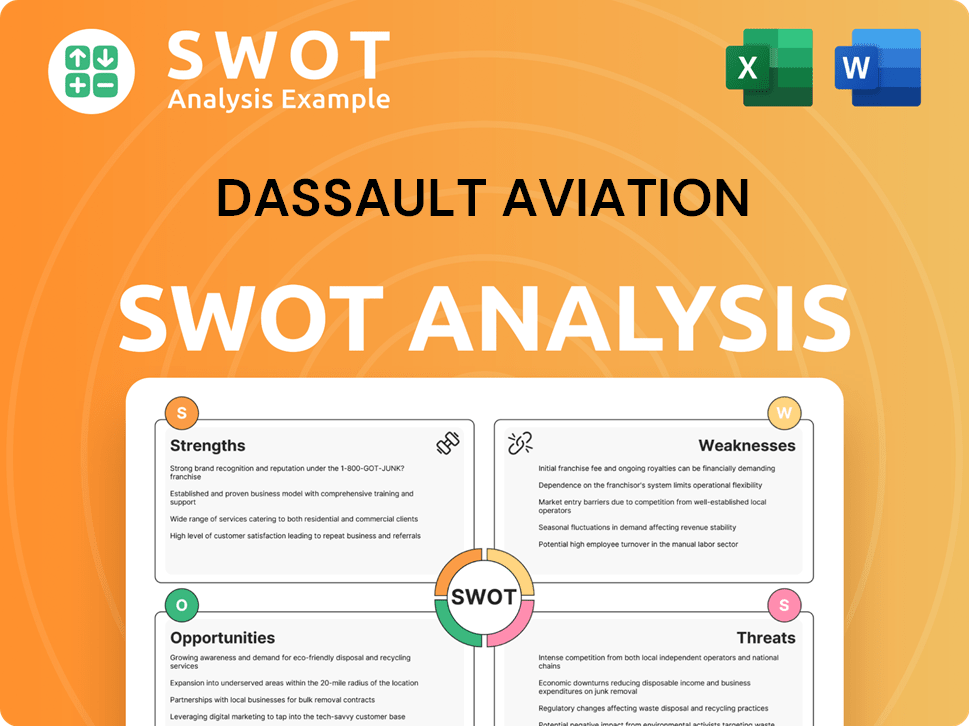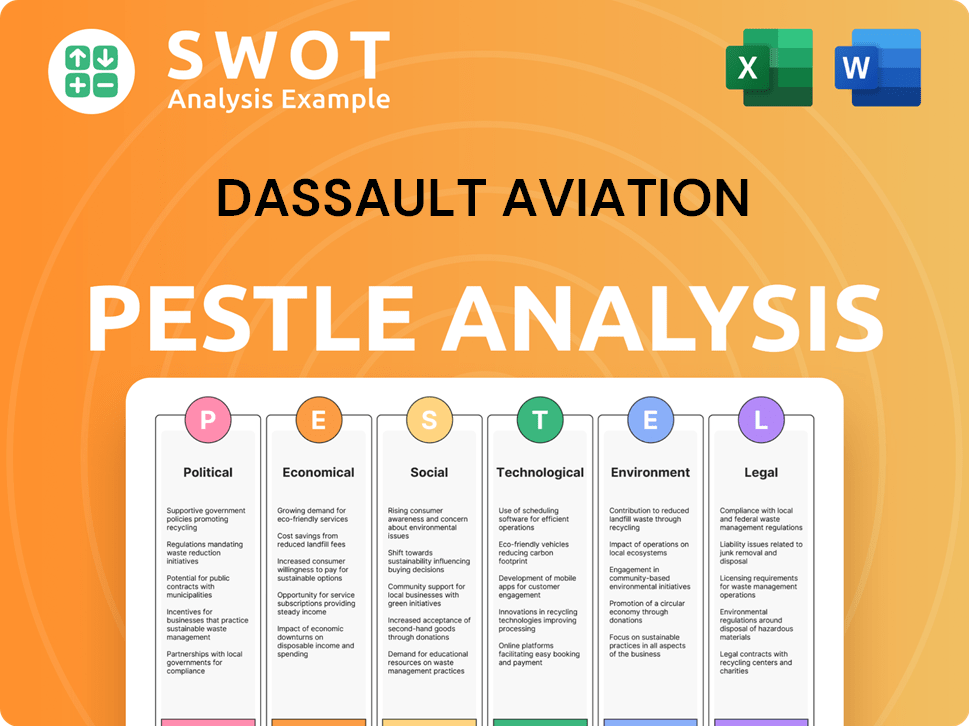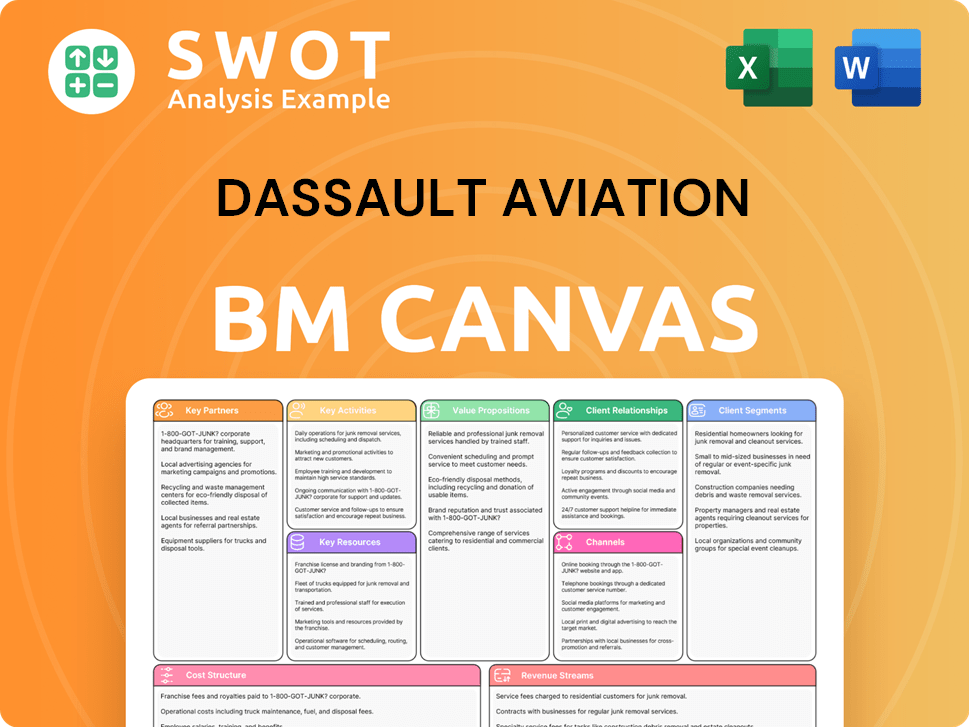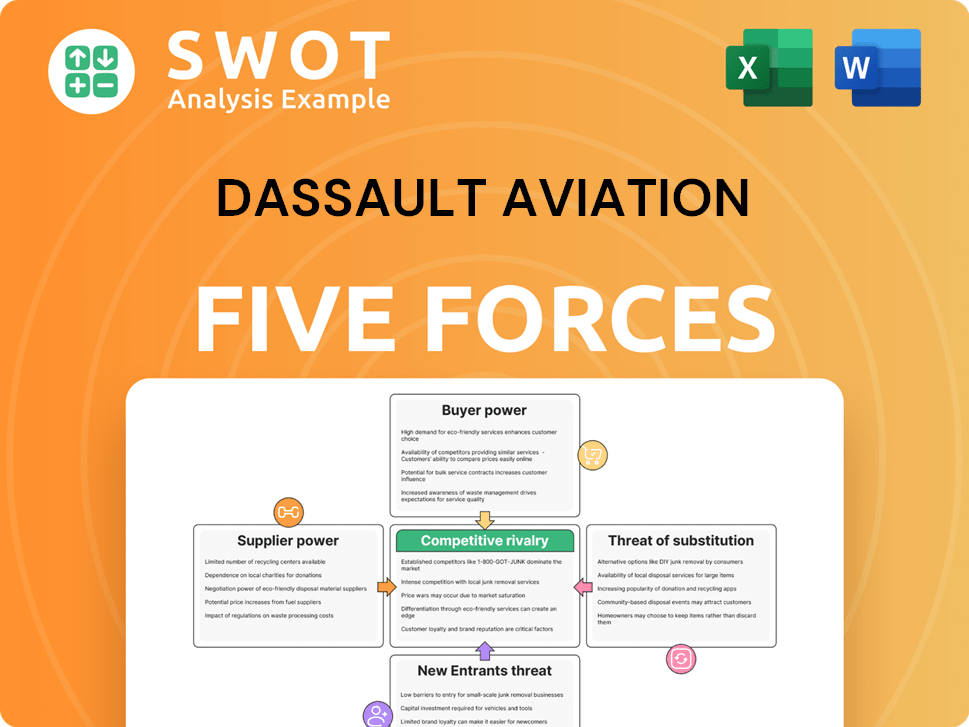Dassault Aviation Bundle
How Does Dassault Aviation Dominate the Skies?
From its inception in 1929, Dassault Aviation has been a titan of the aerospace industry, evolving from military aircraft to the pinnacle of business jets. Its success is not just about engineering marvels; it's a story of strategic sales and marketing prowess. Discover the secrets behind Dassault's enduring legacy and its ability to capture the attention of both governments and high-net-worth individuals.

Dassault Aviation's impressive financial results, including a record order backlog, highlight the effectiveness of its Dassault Aviation SWOT Analysis. This analysis will delve into Dassault's sales and marketing strategies, examining how the company navigates the competitive business jet market and implements its Falcon aircraft sales strategies. We'll explore its targeted approach, analyze the impact of its marketing campaigns, and review its overall aviation industry analysis to understand how Dassault maintains its leading position.
How Does Dassault Aviation Reach Its Customers?
The sales and marketing strategy of Dassault Aviation centers on distinct approaches for its military and business jet divisions. For military aircraft, such as the Rafale, the company employs a direct sales model, negotiating directly with government entities worldwide. This strategy is characterized by long-term agreements and governmental collaborations.
In contrast, for its Falcon business jets, Dassault Aviation utilizes a direct sales team targeting corporate executives and high-net-worth individuals globally. The company's website serves as a critical informational hub, showcasing its aircraft. Furthermore, Dassault emphasizes customer support and maintenance to boost aftermarket revenue.
Dassault Aviation's approach to sales channels is multifaceted, adapting to the specific needs of its diverse product lines. The company's strategic focus includes strengthening its supply chain and increasing production rates to meet demand, which indicates a direct influence of sales success on operational adjustments. Key partnerships, such as the Dassault Reliance Aerospace Limited (DRAL) joint venture in India, contribute to growth by localizing production of certain components.
Dassault Aviation's primary sales channel for military aircraft, like the Rafale, involves direct engagement with defense ministries and air forces. This approach facilitates complex negotiations and inter-governmental agreements, as seen with the order for Rafale jets in 2024. This direct sales model is crucial for securing large-scale military contracts.
For Falcon business jets, Dassault Aviation employs a direct sales team that targets corporate executives, government officials, and VIPs worldwide. The company's website serves as a crucial informational hub, showcasing its aircraft and capabilities. This sales channel is tailored to the specific needs of the business jet market.
Dassault Aviation focuses on customer support and maintenance throughout the product lifecycle, investing significantly to expand and improve customer service. This strategy is particularly important for its Falcon jets, where aftermarket revenue is expected to rise. This approach enhances customer relationships and drives long-term profitability.
Partnerships like the Dassault Reliance Aerospace Limited (DRAL) joint venture in India support growth by localizing production of components. The company also focuses on strengthening its supply chain and increasing production rates to meet demand. These strategic moves reflect the company's commitment to operational efficiency and market responsiveness.
Dassault Aviation's sales strategy is segmented, with direct sales dominating both military and business jet markets. The company's focus on customer support and strategic partnerships underscores its commitment to long-term growth. In 2024, Dassault secured orders for 30 Rafale jets, and in April 2025, an order for 26 Rafale Marine jets was finalized, highlighting the effectiveness of its sales approach.
- Direct sales to governments and corporations.
- Emphasis on customer support and aftermarket services.
- Strategic partnerships for localized production.
- Website as a crucial informational hub.
Dassault Aviation SWOT Analysis
- Complete SWOT Breakdown
- Fully Customizable
- Editable in Excel & Word
- Professional Formatting
- Investor-Ready Format

What Marketing Tactics Does Dassault Aviation Use?
Dassault Aviation's marketing tactics are designed to build brand awareness, generate leads, and drive sales in the specialized aerospace industry. Their approach combines both digital and traditional methods to reach their target audiences effectively. The company focuses on highlighting technological advancements and sustainability efforts to appeal to a discerning clientele.
The company's strategy includes a strong emphasis on content marketing, showcasing innovations in avionics, aerodynamics, and sustainable aviation fuel (SAF) capabilities. They also focus on data-driven marketing and customer segmentation, tailoring their approach to specific target audiences for both military and business jets. The integration of sustainability and corporate responsibility is a key differentiator in the competitive aerospace market.
While specific details on digital marketing spend are not publicly available, Dassault Aviation's approach is evident through their participation in key industry events like EBACE. This participation is a critical traditional marketing channel for showcasing new innovations and engaging with potential clients. Their 'Leading our Future' transformation plan also indicates a move towards technology platforms for enhanced marketing and customer relationship management.
Dassault Aviation uses content marketing to showcase advancements in avionics, aerodynamics, and sustainable aviation fuel (SAF) capabilities. The Falcon 10X is the first Falcon to be certified for 100% SAF use.
The company focuses on specific target audiences for its military and business jets, such as the Asian market for the Falcon 10X. This targeted approach helps with Dassault Aviation's brief history.
Dassault Aviation's 'Leading our Future' plan includes digital transformation, such as using 3DExperience and SAP solutions. This suggests an adoption of technology platforms for enhanced marketing and customer relationship management.
Participation in industry events like EBACE is a critical traditional marketing channel. These events allow the company to showcase new innovations and engage with potential clients directly.
The company integrates sustainability and corporate responsibility as core components of its marketing strategy. This approach differentiates itself in the competitive aerospace market.
Dassault Aviation's marketing mix has evolved to integrate sustainability and corporate responsibility as core components. This is a key differentiator in the competitive aerospace market.
Dassault Aviation's marketing strategy is multifaceted, incorporating digital and traditional methods. The company emphasizes technological advancements and sustainability. This approach is tailored to specific target audiences.
- Content Marketing: Showcasing innovations in avionics, aerodynamics, and SAF.
- Targeted Segmentation: Focusing on specific audiences like the Asian market for the Falcon 10X.
- Digital Transformation: Utilizing platforms like 3DExperience and SAP for enhanced efficiency.
- Traditional Channels: Participating in events like EBACE to engage with clients.
- Sustainability: Integrating corporate responsibility as a core marketing component.
Dassault Aviation PESTLE Analysis
- Covers All 6 PESTLE Categories
- No Research Needed – Save Hours of Work
- Built by Experts, Trusted by Consultants
- Instant Download, Ready to Use
- 100% Editable, Fully Customizable

How Is Dassault Aviation Positioned in the Market?
Dassault Aviation strategically positions itself as a leader in the high-performance aircraft market, focusing on innovation, reliability, and operational efficiency. Their brand identity centers on a heritage of aviation excellence, with a commitment to advanced technology and superior customer experience. This positioning is crucial in the competitive business jet market, allowing them to differentiate from rivals like Gulfstream and Bombardier.
The company's core message revolves around excellence and a pioneering spirit, which is reflected in its visual identity and consistent branding across all touchpoints. The use of Dassault Aviation Blue and the upward-pointing quill in its logo symbolize precision and forward-thinking, reinforcing their commitment to high standards. This brand consistency helps in maintaining a strong market presence and customer recognition.
Dassault Aviation aims to increase its market share in the business jet sector to 20% by 2025. This ambitious goal underscores the importance of their brand positioning strategy, which emphasizes innovation, sustainability, and customer satisfaction. The company's approach involves continuous advancements in avionics, aerodynamics, and sustainable practices to appeal to a discerning clientele.
Dassault Aviation differentiates itself through continuous innovation, particularly with new models like the Falcon 6X and the upcoming Falcon 10X. These aircraft are designed to set new standards in the business jet market. This focus helps enhance their Dassault Aviation sales.
Dassault Aviation is committed to sustainability, with goals to reduce its carbon footprint and promote Sustainable Aviation Fuel (SAF). This focus appeals to environmentally conscious customers. This commitment is a key part of their Dassault Aviation marketing strategy.
The brand maintains consistency across all touchpoints, from its corporate headquarters to its subsidiaries. This uniformity reinforces brand recognition and trust. The consistent branding supports their overall Dassault Aviation strategy.
Dassault Aviation targets high-net-worth individuals and corporations seeking premium business jets. Their focus on performance and comfort directly appeals to this demographic. Understanding their target market is crucial for Dassault Falcon jet sales strategy.
The company's brand positioning is further strengthened by its commitment to customer satisfaction and after-sales service. By focusing on these key areas, Dassault Aviation aims to not only increase its market share but also build long-term customer loyalty. For more insights, consider exploring the Competitors Landscape of Dassault Aviation.
Dassault Aviation Business Model Canvas
- Complete 9-Block Business Model Canvas
- Effortlessly Communicate Your Business Strategy
- Investor-Ready BMC Format
- 100% Editable and Customizable
- Clear and Structured Layout

What Are Dassault Aviation’s Most Notable Campaigns?
The success of Dassault Aviation's sales strategy is significantly influenced by the continued strong performance of its Rafale fighter jet. Key campaigns revolve around securing and fulfilling orders for the Rafale, with a focus on export markets and strategic partnerships like the 'Make in India' program. This approach has resulted in a substantial order backlog, ensuring sustained growth and market presence. The company's marketing efforts are clearly geared towards leveraging the Rafale's combat-proven reputation and versatility to capture new contracts globally.
In addition to the defense sector, Dassault's marketing and sales strategies are also heavily invested in the business jet market, with campaigns centered around the Falcon aircraft series. The launch and promotion of the Falcon 6X and the upcoming Falcon 10X are crucial, aiming to set new industry standards for comfort, performance, and sustainability. These initiatives, coupled with a focus on fuel efficiency and environmental responsibility, highlight Dassault's commitment to meeting evolving customer needs and maintaining its competitive edge in the aviation industry.
The company's recent performance underscores the effectiveness of its dual-pronged approach. Dassault delivered 21 Rafale jets in 2024, exceeding its target, and is aiming for 25 deliveries in 2025. The business jet segment also saw solid results, with 31 Falcon aircraft delivered in 2024 and 26 new orders secured. This balanced strategy ensures that Dassault Aviation remains a prominent player in both defense and civilian aviation markets, driving its overall sales and market share.
The Rafale fighter jet is central to Dassault Aviation's sales strategy. In 2024, the company secured significant export orders for 30 Rafale jets. The sustained demand for the Rafale bolsters Dassault's order backlog, which reached a record €43.2 billion as of December 31, 2024.
The Falcon 6X and the upcoming Falcon 10X are key in the business jet market. The Falcon 6X entered service in early 2024. Dassault delivered 31 Falcon aircraft in 2024 and secured 26 new orders. These campaigns focus on innovation and sustainability.
The 'Make in India' program is a critical initiative for future Rafale orders. This involves local production of parts. This positions Dassault for deeper localization and export opportunities, supporting the company's international sales strategy.
Dassault delivered 21 Rafale jets in 2024, exceeding its target. The company aims to deliver 25 Rafale jets in 2025. This highlights the company's sales performance review and its commitment to fulfilling orders.
Dassault Aviation's strategic focus on both defense and business aviation, combined with targeted marketing campaigns, has positioned it well in the competitive landscape. The company's ability to secure large orders, such as the recent Rafale sales to Indonesia and Serbia, demonstrates its effective international sales strategy. Furthermore, the emphasis on innovation and sustainability in its business jet offerings, like the Falcon 6X, aligns with current market demands, contributing to its sustained success in the aviation industry. For further insights into the financial performance and ownership structure, consider reading this article: Owners & Shareholders of Dassault Aviation.
Dassault Aviation Porter's Five Forces Analysis
- Covers All 5 Competitive Forces in Detail
- Structured for Consultants, Students, and Founders
- 100% Editable in Microsoft Word & Excel
- Instant Digital Download – Use Immediately
- Compatible with Mac & PC – Fully Unlocked

Related Blogs
- What are Mission Vision & Core Values of Dassault Aviation Company?
- What is Competitive Landscape of Dassault Aviation Company?
- What is Growth Strategy and Future Prospects of Dassault Aviation Company?
- How Does Dassault Aviation Company Work?
- What is Brief History of Dassault Aviation Company?
- Who Owns Dassault Aviation Company?
- What is Customer Demographics and Target Market of Dassault Aviation Company?
Disclaimer
All information, articles, and product details provided on this website are for general informational and educational purposes only. We do not claim any ownership over, nor do we intend to infringe upon, any trademarks, copyrights, logos, brand names, or other intellectual property mentioned or depicted on this site. Such intellectual property remains the property of its respective owners, and any references here are made solely for identification or informational purposes, without implying any affiliation, endorsement, or partnership.
We make no representations or warranties, express or implied, regarding the accuracy, completeness, or suitability of any content or products presented. Nothing on this website should be construed as legal, tax, investment, financial, medical, or other professional advice. In addition, no part of this site—including articles or product references—constitutes a solicitation, recommendation, endorsement, advertisement, or offer to buy or sell any securities, franchises, or other financial instruments, particularly in jurisdictions where such activity would be unlawful.
All content is of a general nature and may not address the specific circumstances of any individual or entity. It is not a substitute for professional advice or services. Any actions you take based on the information provided here are strictly at your own risk. You accept full responsibility for any decisions or outcomes arising from your use of this website and agree to release us from any liability in connection with your use of, or reliance upon, the content or products found herein.